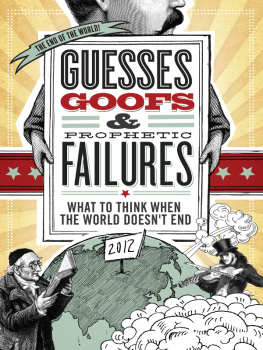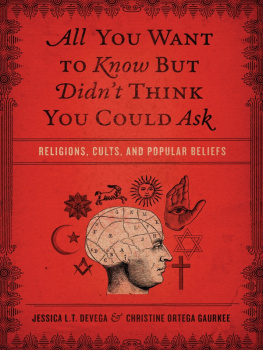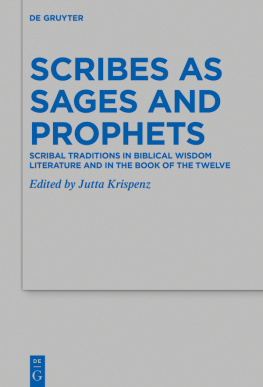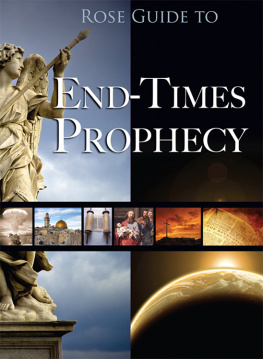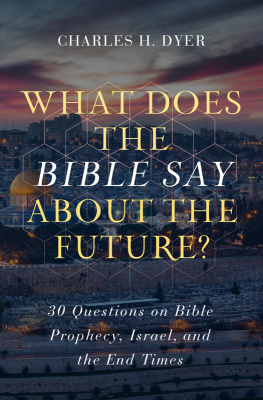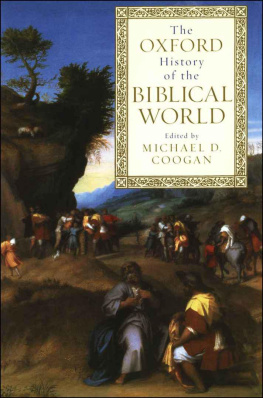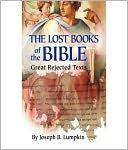
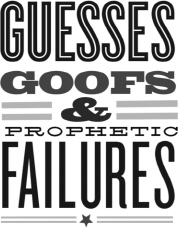
2012 by Thomas Nelson Publishers
All rights reserved. No portion of this book may be reproduced, stored in a retrieval system, or transmitted in any form or by any meanselectronic, mechanical, photocopy, recording, scanning, or otherexcept for brief quotations in critical reviews or articles, without the prior written permission of the publisher.
Published in Nashville, Tennessee, by Thomas Nelson. Thomas Nelson is a registered trademark of Thomas Nelson, Inc.
Page design: Crosslin Creative
Images: Dover Pictorial Archives
Thomas Nelson, Inc., titles may be purchased in bulk for educational, business, fund-raising, or sales promotional use. For information, please e-mail SpecialMarkets@ThomasNelson.com.
ISBN: 9-781-4016-7682-7
Printed in the United States of America
12 13 14 15 16 QG 6 5 4 3 2 1
CONTENTS
T his book comes out of three great loves of my life: the Bible, popular culture, and my students. As a biblical scholar, I know how much the Bibles ancient stories and images continue to have an impact on the modern world. They pop up continually in discussions with my students; I see them in popular media like True Blood, and I hear them in music from Leonard Cohen to Kanye West. And yet, I also know how often people who claim to know the Bible actually know the traditions passed down to them from their parents, Sunday school teachers, and popular culture. These traditions are not bad; indeed, they are often beautiful and tenderly shared. Unfortunately, they are also often inaccurate, poorly interpreted, or flat out not part of the shared text. Too often, what we think is in the Bible is actually an indicator of our own biases and preconceptions, rather than accurate to Scripture, and it leads to stereotyping and mistreatment of others who have a different Bible than we do.
In the spring of 2009, I facilitated a senior seminar with my students on apocalyptic texts; in the spring of 2011, a different group of seniors explored death and immortality in the ancient world. In both cases, I learned an enormous amount from my students about the questions they have, and their search to understand the world around them. I hope that this book will be a way for my students to engage biblical texts and their subsequent interpretations with honesty and optimism. I hope it will offer them a path to see others, some of whom are very different, as shared pilgrims on the path to understanding. And I hope that you, the reader, whoever you are, will feel invited to challenge your own perceptions, beliefs, and ideas as you join us on this journey.
The process of writing a book is not a solo endeavor, and I am grateful for those that believed in me and aided me throughout: my editor and fellow sci-fi geek Heather; the Morningside College writing group; my colleagues and dear friends Jeremy, David, Chris, Rachel, Kim, Brenda, and Bruce who acted as cheerleaders and coaches; and my girls, who put up with many lost hours of mom time so I could finish. Thank you all.
THIS IS THE END!
The first time I remember hearing about the end of the world, I was at a friends middle school youth group meeting. That night a member of the senior high group asked me, in serious tones, if I was pre-tribulationist or post-tribulationist. I had never heard either of these words, and I told him so. In an obviously well-rehearsed speech, he told me how the Revelation predicted that the world would end soon and that Christians who were concerned about this event were divided as to whether the true believers would be raptured before the earths devastation or after a period of waiting and testing. He ended his discussion with a pointed reminder that, whatever the correct interpretation of Revelation was, we were going to see the cataclysmic destruction of the world any day now, and that I best be ready for the end. I did not sleep that night.
I never did ask him why it mattered if I was pre-trib or post-trib. I was too scared by the idea that the world was in such bad shape and headed for something worse. I had been a bright-eyed optimist about the world until this point. I was well-fed and had loving parents, brothers who playfully teased me, education, and safety. I thought people were basically good, and thus the world was basically good. Further, it had never occurred to me that the Bible predicted anything. I was raised in the churchfor a while my dad was my minister but in all that time the Bible was understood as a life-guide, a teaching tool, a moral example, and a view into the foundations of our faith. It was not a crystal ball. This young mans view of the world, and of the Bible, was a terrifying new view of everything I thought I understood.
This book is an attempt to understand such interpretations of impending doom, which we generally call apocalyptic. Apocalypticism is a belief in the coming end of this (evil) world and the dawn of a new, better one. It comes out of an ancient worldview, borne from feelings of persecution, fear, and distress, held by Jews and the earliest Christians. Because of their common concerns, and shared worldview, the Jews and early Christians produced texts that had many features in common. They relied on similar use of imagery, coded language, and other conventions, and these shared features eventually marked the genre as apocalyptic. Some texts like Daniel and Revelation are now part of Scripture, but others such as Enoch did not make the cut. Over centuries, these texts of apocalypticism were reused, reinterpreted, and rediscovered by others, and made to apply to their own time. Eventually, the apocalyptic worldview became widely accepted and much believed. Today, according to some recent surveys, one in four Americans believe that the world will end within his or her lifetime (Keller 8). Many more believe that the end will occur soon, if only slightly after their time on earth is done. What is the draw of such a worldview and where does it come from? How has it appeared and reappeared throughout history, and why do we keep coming back to it? What happens to believers when the end does not arrive on schedule? Since I was that middle school youth, these questions have perplexed me. Perhaps they perplex you too.
THE SCOPE OF THE BOOK
I am a biblical scholar by training. I look at the ancient texts that came to be accepted by Jewish and Christian leaders as authoritative, as well as those they rejected, to understand the mindset of at least some of the founders of these Western faiths. In this book, I will rely on that training for the first part of our discussion, What Is Apocalypticism? The Bible and other ancient Jewish and Christian writings are of a variety of genres and types, including poetry, law, letters, and parables. The genre commonly known as apocalyptic, which was mentioned above, is the particular type of literature from which many later prophets of the end have drawn their predictions. In this first section, I will discuss where apocalyptic literature came from as well as what attributes mark it as different from other types of biblical literature. I will then look at specific examples of ancient apocalyptic texts, from the non-biblical book of Enoch to the last book of the Christian New Testament, the Revelation (or the Apocalypse of John as it was known in the ancient world).
Of course, the amazing thing about these ancient texts is that they did not cease to be meaningful after the Canon was closed.

Next page
